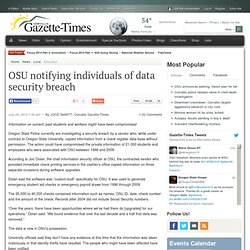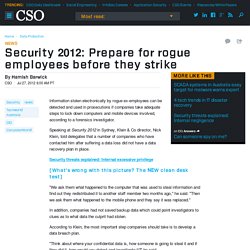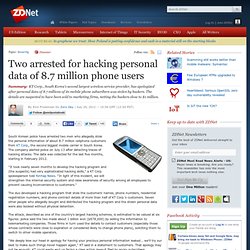

High Technology Threat Brief (HTTB) The story of the world's first free-range computer virus. How hackers can steal your debit card info. Tabnabbing: A New Type of Phishing Attack « Aza on Design. The Dangers of Computer Hacking - Digital Forensics, Inc. High Technology Threat Brief (HTTB) Computer jocks hack off web safety myths - The Times of India. Researcher creates proof-of-concept malware that infects BIOS, network cards. High Technology Threat Brief (HTTB) High Technology Threat Brief (HTTB) Researchers See Real-Time Phishing Jump - Dark Reading. More Than Half Of Major Banks Infected With Conficker, Zeus, Fake AV, Other Malware - Dark Reading.
Taking USB Attacks To The Next Level - Dark Reading. Def Con: Experts Sound Alarm About Global Meeting On Internet's Future - Dark Reading. High Technology Threat Brief (HTTB) HIPAA Breaches Show a Need for Multi-Layered Security policies network security wiki. Rogue Mobile Apps, Phishing, Malware and Fraud « Speaking of Security – The RSA Blog and Podcast. Pro tips from social engineering hackers. High Technology Threat Brief (HTTB) NU hacking case underscores global cyber battle – KHAS. Insider threat as prime security concern. Hackers Convene To Find Mobile Security Flaws - NPR News. 20 Best tips to prevent Viruses and Malwares from PC - Technology Articles Daily. Researcher Creates Proof-of-concept Malware That Infects BIOS, Network Cards. High Technology Threat Brief (HTTB) Security Sage's Guide to Hardening the Network Infrastructure. Taking Cybersecurity Lessons To The Bank - Dark Reading.
Black Hat's Graduation - Dark Reading. Do not Get Caught by a Phishing Scheme. High Technology Threat Brief (HTTB) From Wow to How 3: Mobile Workstyles and Cloud Services by Citrix Systems, Inc. OSU notifying individuals of data security breach. Information on current, past students and workers might have been compromised Oregon State Police currently are investigating a security breach by a vendor who, while under contract to Oregon State University, copied information from a check register data base without permission.

The action could have compromised the private information of 21,000 students and employees who were associated with OSU between 1996 and 2009. According to Jon Dolan, the chief information security officer at OSU, the contracted vendor who provided immediate check printing services in the cashier’s office copied information on three separate occasions during software upgrades. Dolan said the software was “custom-built” specifically for OSU. It was used to generate emergency student aid checks or emergency payroll draws from 1996 through 2009. The 30,000 to 40,000 checks contained information such as names, OSU ID, date, check number and the amount of the check.
The data is now in OSU’s possession. 13 Security Tips to Combat Mobile Device Threats to Healthcare. Mobile devices—thumb drives, smartphones, external hard drives, tablets and laptops—are increasingly exposing protected health information (PHI) in the healthcare space, with threat risks growing, according to the Department of Homeland Security.

Mobile devices pose significant risks for privacy incidents for healthcare organizations, providers and entities responsible for safeguarding protected health information (PHI) under Federal HITECH and HIPAA regulations. Since patient data can be moved, processed and shared via personal cel phones and tiny USB flash drives, the Bring-Your-Own-Device phenomenon can wreak havoc on a hospital. To assist healthcare entities reduce privacy incidents resulting from mobile risks, 13 experts—representing legal, data breach prevention, technology, healthcare IT, and security—offer these top tips for healthcare organizations Download the complete guide here.
Researcher Creates Proof-of-concept Malware That Infects BIOS, Network Cards CIO. IDG News Service — Security researcher Jonathan Brossard created a proof-of-concept hardware backdoor called Rakshasa that replaces a computer's BIOS (Basic Input Output System) and can compromise the operating system at boot time without leaving traces on the hard drive.

Brossard, who is CEO and security research engineer at French security company Toucan System, demonstrated how the malware works at the Defcon hacker conference on Saturday, after also presenting it at the Black Hat security conference on Thursday. Rakshasa, named after a demon from the Hindu mythology, is not the first malware to target the BIOS -- the low-level motherboard firmware that initializes other hardware components. However, it differentiates itself from similar threats by using new tricks to achieve persistency and evade detection. Rakshasa was built with open source software.
Existent computer architecture gives every peripheral device equal access to RAM (random access memory), Brossard said. Power Plant Hack Talk, Free Tools Pulled From Def Con Lineup. Security 2012: Prepare for rogue employees before they strike. Information stolen electronically by rogue ex-employees can be detected and used in prosecutions if companies take adequate steps to lock down computers and mobile devices involved, according to a forensics investigator.

Speaking at Security 2012 in Sydney, Klein & Co director, Nick Klein, told delegates that a number of companies who have contacted him after suffering a data loss did not have a data recovery plan in place. Security threats explained: Internal excessive privilege "We ask them what happened to the computer that was used to steal information and find out they redistributed it to another staff member two months ago," he said. "Then we ask them what happened to the mobile phone and they say it was replaced.
" In addition, companies had not saved backup data which could point investigators to clues as to what data the culprit had stolen. According to Klein, the most important step companies should take is to develop a data breach plan. Two arrested for hacking personal data of 8.7 million phone users. South Korean police have arrested two men who allegedly stole the personal information of about 8.7 million cellphone customers from KT Corp., the second biggest mobile carrier in South Korea.

The company alerted police on July 13 after detecting traces of hacking attacks. The data was collected for the last five months, starting in February 2012. "It took nearly seven months to develop the hacking program and (the suspects) had very sophisticated hacking skills," a KT Corp. spokesperson told Yonhap News.